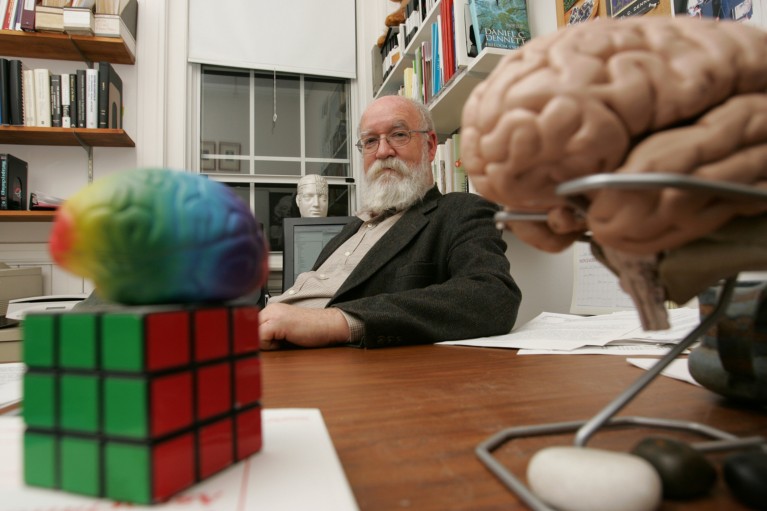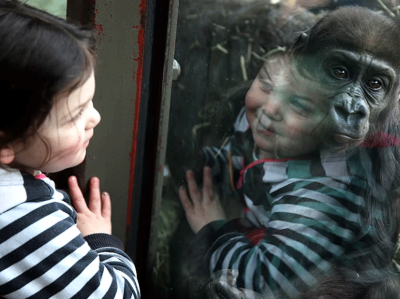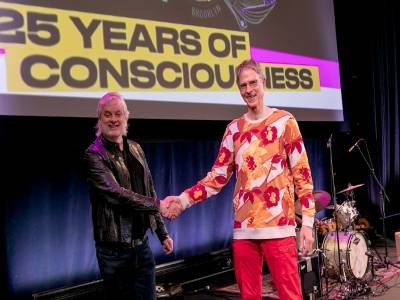
Credit score: Rick Friedman/Corbis/Getty
Daniel Dennett, who has died aged 82, was the kind of thinker you couldn’t assist however learn. His work, instantly related to biologists, physicists, pc scientists and cognitive psychologists, enticed all curious readers. He expressed daring, sharp views on a few of the largest questions on human existence: what’s consciousness, and the way is it associated to neural exercise? Do we’ve got free will? How, if in any respect, are we completely different from artificial-intelligence techniques? And — a query that famously positioned him as one of many ‘4 horsemen’ of latest atheism, along with Christopher Hitchens, Richard Dawkins and Sam Harris — does God exist?
Dennett’s solutions to those questions usually prompted nice enthusiasm or disagreement — by no means indifference. From the beginning of his research, Dennett was eager on making a distinction, and was assured in his means to take action. As he described in his memoir I’ve Been Considering (2023), as a first-year pupil at Wesleyan College in Middletown, Connecticut, he learn books by the thinker Willard Quine, and determined that he ought to “go to Harvard and confront this man with my corrections to his errors!” He proceeded to do each: transferring to Harvard College in Cambridge, Massachusetts, the place he criticized Quine’s account of odd language in his honours thesis.
Born in Boston, Massachusetts, in 1942, Dennett spent a part of his childhood in Beirut, Lebanon, as a result of his father was a undercover agent on the US Workplace of Strategic Companies. In 1947, his father died in a airplane crash in Ethiopia, and the household moved again to Boston. After graduating from Harvard, he gained a PhD on the College of Oxford, UK, in 1965, the place he explored the idea of intentionality, which might underpin a lot of his later work. After a six-year spell on the College of California, Irvine, he moved to Tufts College in Medford, Massachusetts, which grew to become his educational house.
Consciousness: what it’s, the place it comes from — and whether or not machines can have it
Dennett thought that one of the simplest ways to shine his concepts was to debate them with undergraduate college students; even two weeks earlier than his demise, he held an internet class a few paper he was engaged on. He welcomed opposing views with an open thoughts, serving to his college students to assume extra critically and to refine their arguments, even once they challenged his personal views.
One in all his fundamental endeavours was to explain the human thoughts — particularly, consciousness — in a manner that’s strongly rooted within the third-person perspective, which he referred to as heterophenomenology. He needed to depend on each scientific proof and ‘folks psychology’; the everyday ways in which individuals perceive, interpret and predict the behaviours of others. Utilized to consciousness, the third-person perspective implies that individuals don’t have privileged information about their very own aware experiences.
Dennett needed to demystify consciousness, and referred to as for data-driven analysis to check it. This demystification, importantly, concerned parting with the idea of ‘qualia’ — the ineffable, first-person elements of aware expertise, such because the greenness of grass or the sweetness of chocolate.
“The kind of distinction that individuals think about to be between any machine and any human experiencer … is one I’m firmly denying: There isn’t a such distinction. There simply appears to be,” he wrote in his 1991 e book Consciousness Defined. This naturally provoked nice criticism and debate.
A few of Dennett’s debates with fellow philosophers and scientists grew to become well-known, resembling that with Sam Harris about free will. Dennett argued that individuals have free will due to their means to deliberate, cause and even cause about reasoning; talents that Dennett argued developed by way of evolution. Harris believes that free will is an phantasm.
Different debates became long-lasting feuds, which he additionally appeared to take pleasure in. Dennett emphasised the significance of pure choice in growing adaptive traits. This was one among his details of rivalry with biologist Stephan Jay Gould, who advocated for a extra plural view of evolution, during which pure choice is just one attainable precept by which traits have developed.
A long time-long guess on consciousness ends — and it’s thinker 1, neuroscientist 0
In accordance with Dennett, faith arose from a mix of language and people’ consideration to alarming occasions. Collectively, they fostered the event of fantasies, or “culturally developed techniques of memes that arose naturally out of our innate vigilance and sociality”, as he stated in I’ve Been Considering. Faith, for him, was the domestication of those fantasies.
Dennett was a champion of data dissemination, translating difficult concepts into clear, typically sensational, however at all times attention-grabbing statements. He delivered thought-provoking, philosophical TED talks and introduced the ‘mind in a vat’ thought experiment to the BBC’s viewers. A real interdisciplinarian who argued fiercely for breaking the silos of data, he collaborated with pc scientists to create a humanoid robotic, with cognitive scientists to higher perceive the intricacies of notion and with biologists to refine his account of evolution.
Later in life, Dennett continued to hunt adventures. He beloved to sail his 13-metre crusing boat (named Xanthippe, after Socrates’s spouse), sang at glee golf equipment and performed a myriad of devices.
He additionally lived by his philosophy. In 2006, after a nine-hour coronary heart surgical procedure, he wrote an essay referred to as ‘Thank Goodness!’, explaining that he was grateful to the workers who cared for him, the scientists who developed the drugs to permit the medical doctors to deal with him and even the peer reviewers and journal editors that revealed the work of these scientists — moderately than to God. For him, it was the goodness of the information turbines and truth-seekers all through historical past that needs to be thanked. It’s only becoming that Dennett himself be included on this checklist.




